Tax Consultation Report: Jack Jones' Tax Residency and Income
VerifiedAdded on 2020/07/22
|11
|3023
|45
Report
AI Summary
This report provides a tax consultation for Jack Jones, analyzing his residential status and taxable income for the income tax year ending June 30, 2016. The report begins with an introduction to taxation and the importance of residential status, discussing relevant conditions issued by Canada and Australia. The main body delves into Jack Jones' case scenario, outlining his movements between Australia and Canada, and examines relevant legislation and case laws. It covers the domicile test, 183-day test, and superannuation test for Australian residency, as well as residency requirements in Canada. The report includes a detailed calculation of Jack Jones' taxable income, considering various income sources such as salary, rental income, and benefits. It also addresses deductions and foreign tax credits, providing a comprehensive analysis of Jack Jones' tax liabilities. The conclusion summarizes the findings and references relevant sources.
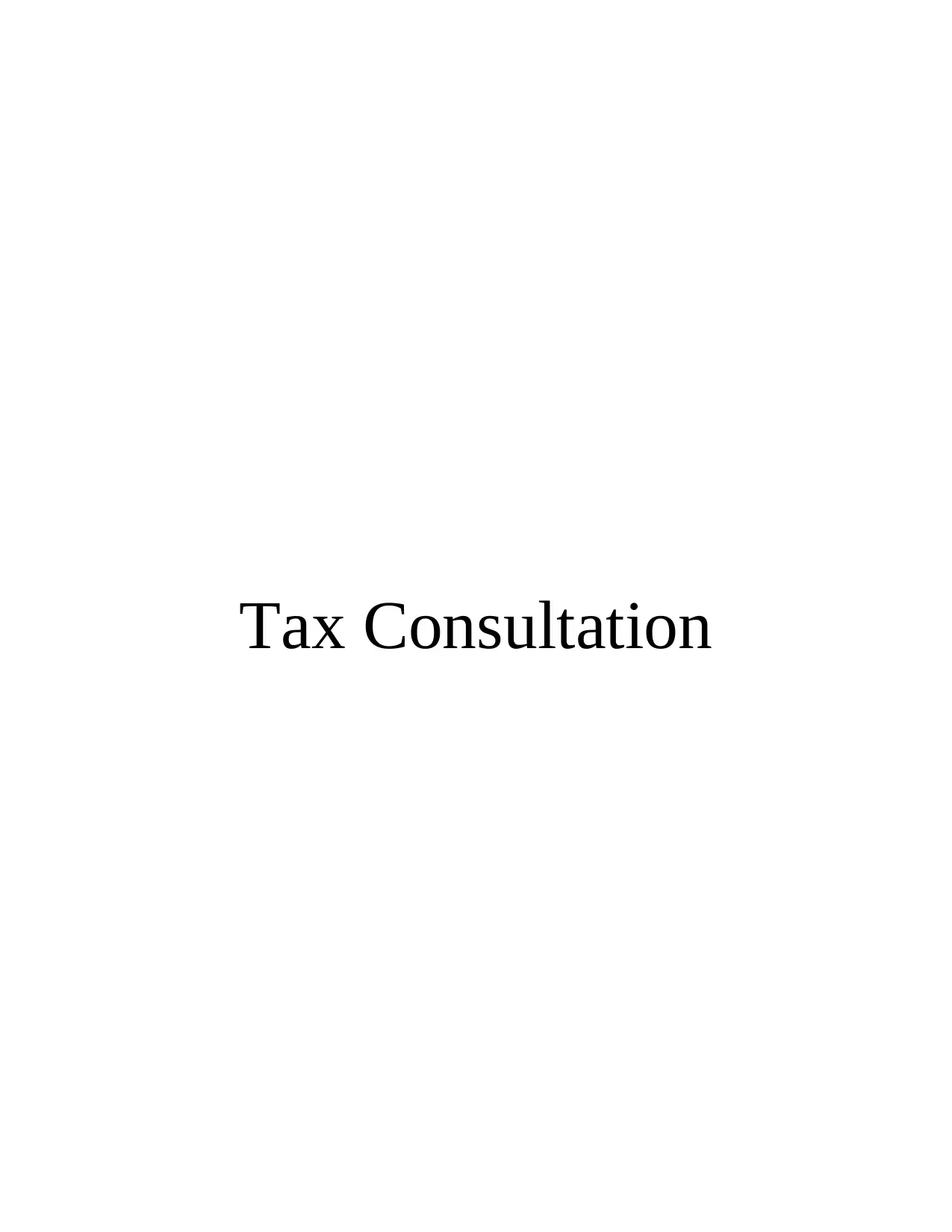
Tax Consultation
Paraphrase This Document
Need a fresh take? Get an instant paraphrase of this document with our AI Paraphraser
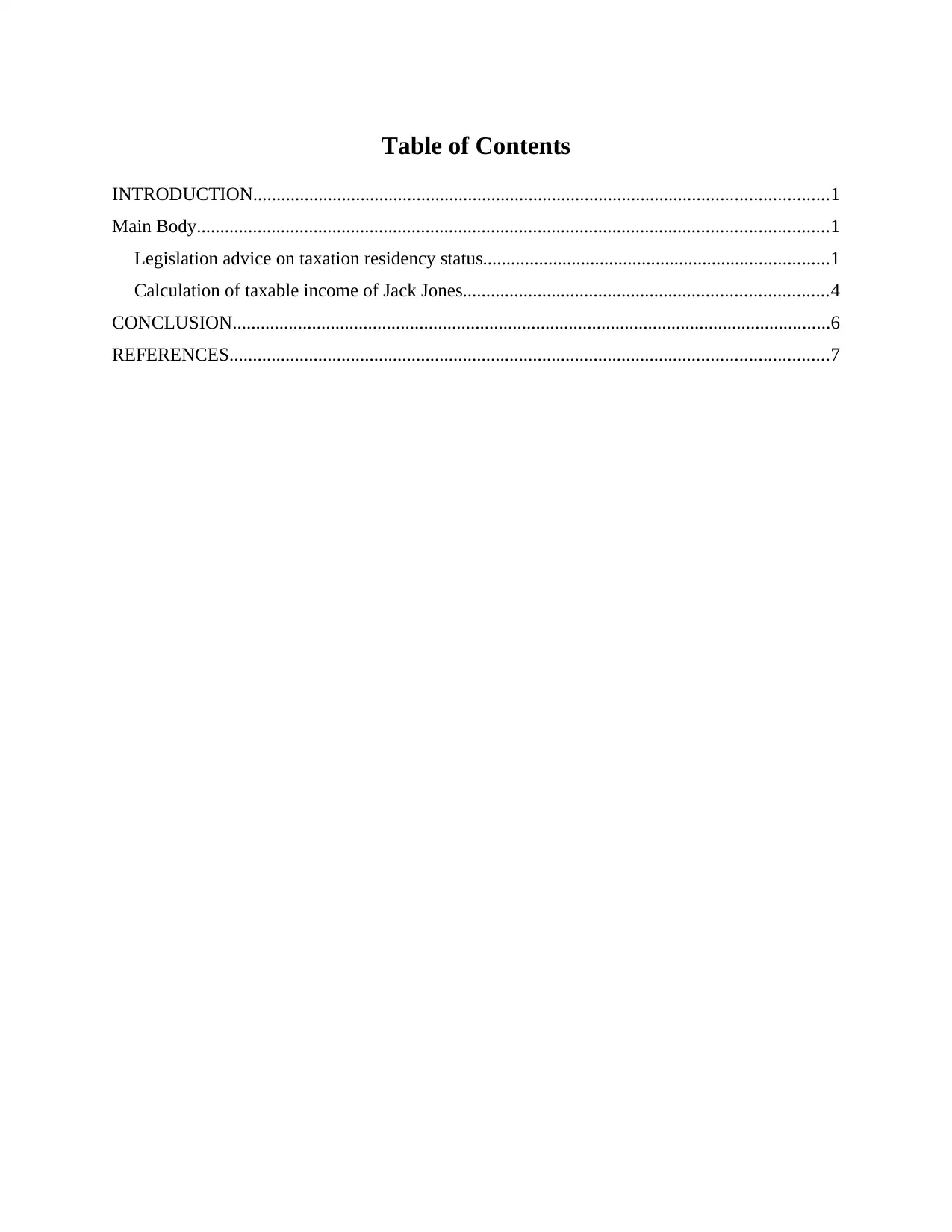
Table of Contents
INTRODUCTION...........................................................................................................................1
Main Body.......................................................................................................................................1
Legislation advice on taxation residency status..........................................................................1
Calculation of taxable income of Jack Jones..............................................................................4
CONCLUSION................................................................................................................................6
REFERENCES................................................................................................................................7
INTRODUCTION...........................................................................................................................1
Main Body.......................................................................................................................................1
Legislation advice on taxation residency status..........................................................................1
Calculation of taxable income of Jack Jones..............................................................................4
CONCLUSION................................................................................................................................6
REFERENCES................................................................................................................................7

Index of Tables
Table 1: Calculation of taxable income...........................................................................................4
Table 1: Calculation of taxable income...........................................................................................4
⊘ This is a preview!⊘
Do you want full access?
Subscribe today to unlock all pages.

Trusted by 1+ million students worldwide
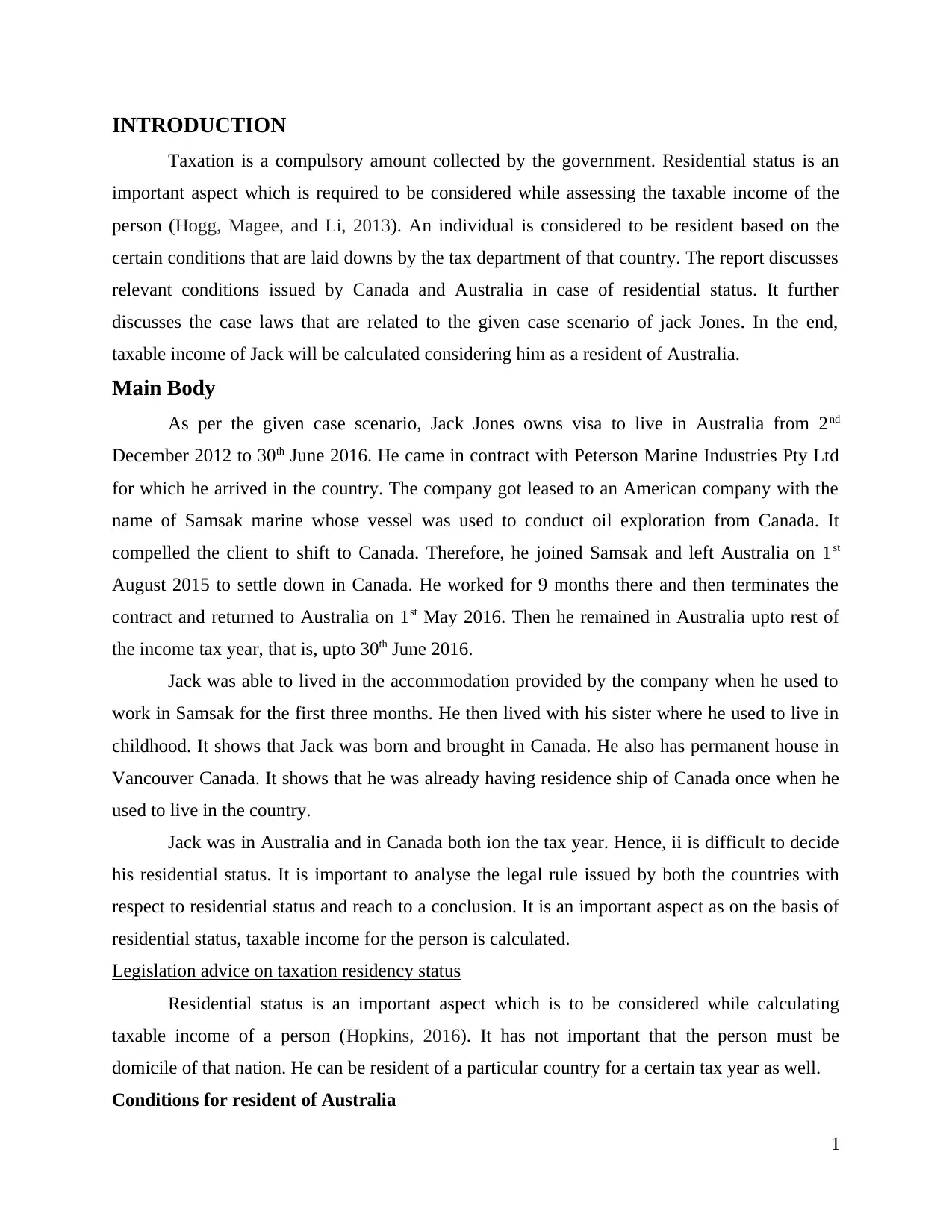
INTRODUCTION
Taxation is a compulsory amount collected by the government. Residential status is an
important aspect which is required to be considered while assessing the taxable income of the
person (Hogg, Magee, and Li, 2013). An individual is considered to be resident based on the
certain conditions that are laid downs by the tax department of that country. The report discusses
relevant conditions issued by Canada and Australia in case of residential status. It further
discusses the case laws that are related to the given case scenario of jack Jones. In the end,
taxable income of Jack will be calculated considering him as a resident of Australia.
Main Body
As per the given case scenario, Jack Jones owns visa to live in Australia from 2nd
December 2012 to 30th June 2016. He came in contract with Peterson Marine Industries Pty Ltd
for which he arrived in the country. The company got leased to an American company with the
name of Samsak marine whose vessel was used to conduct oil exploration from Canada. It
compelled the client to shift to Canada. Therefore, he joined Samsak and left Australia on 1st
August 2015 to settle down in Canada. He worked for 9 months there and then terminates the
contract and returned to Australia on 1st May 2016. Then he remained in Australia upto rest of
the income tax year, that is, upto 30th June 2016.
Jack was able to lived in the accommodation provided by the company when he used to
work in Samsak for the first three months. He then lived with his sister where he used to live in
childhood. It shows that Jack was born and brought in Canada. He also has permanent house in
Vancouver Canada. It shows that he was already having residence ship of Canada once when he
used to live in the country.
Jack was in Australia and in Canada both ion the tax year. Hence, ii is difficult to decide
his residential status. It is important to analyse the legal rule issued by both the countries with
respect to residential status and reach to a conclusion. It is an important aspect as on the basis of
residential status, taxable income for the person is calculated.
Legislation advice on taxation residency status
Residential status is an important aspect which is to be considered while calculating
taxable income of a person (Hopkins, 2016). It has not important that the person must be
domicile of that nation. He can be resident of a particular country for a certain tax year as well.
Conditions for resident of Australia
1
Taxation is a compulsory amount collected by the government. Residential status is an
important aspect which is required to be considered while assessing the taxable income of the
person (Hogg, Magee, and Li, 2013). An individual is considered to be resident based on the
certain conditions that are laid downs by the tax department of that country. The report discusses
relevant conditions issued by Canada and Australia in case of residential status. It further
discusses the case laws that are related to the given case scenario of jack Jones. In the end,
taxable income of Jack will be calculated considering him as a resident of Australia.
Main Body
As per the given case scenario, Jack Jones owns visa to live in Australia from 2nd
December 2012 to 30th June 2016. He came in contract with Peterson Marine Industries Pty Ltd
for which he arrived in the country. The company got leased to an American company with the
name of Samsak marine whose vessel was used to conduct oil exploration from Canada. It
compelled the client to shift to Canada. Therefore, he joined Samsak and left Australia on 1st
August 2015 to settle down in Canada. He worked for 9 months there and then terminates the
contract and returned to Australia on 1st May 2016. Then he remained in Australia upto rest of
the income tax year, that is, upto 30th June 2016.
Jack was able to lived in the accommodation provided by the company when he used to
work in Samsak for the first three months. He then lived with his sister where he used to live in
childhood. It shows that Jack was born and brought in Canada. He also has permanent house in
Vancouver Canada. It shows that he was already having residence ship of Canada once when he
used to live in the country.
Jack was in Australia and in Canada both ion the tax year. Hence, ii is difficult to decide
his residential status. It is important to analyse the legal rule issued by both the countries with
respect to residential status and reach to a conclusion. It is an important aspect as on the basis of
residential status, taxable income for the person is calculated.
Legislation advice on taxation residency status
Residential status is an important aspect which is to be considered while calculating
taxable income of a person (Hopkins, 2016). It has not important that the person must be
domicile of that nation. He can be resident of a particular country for a certain tax year as well.
Conditions for resident of Australia
1
Paraphrase This Document
Need a fresh take? Get an instant paraphrase of this document with our AI Paraphraser
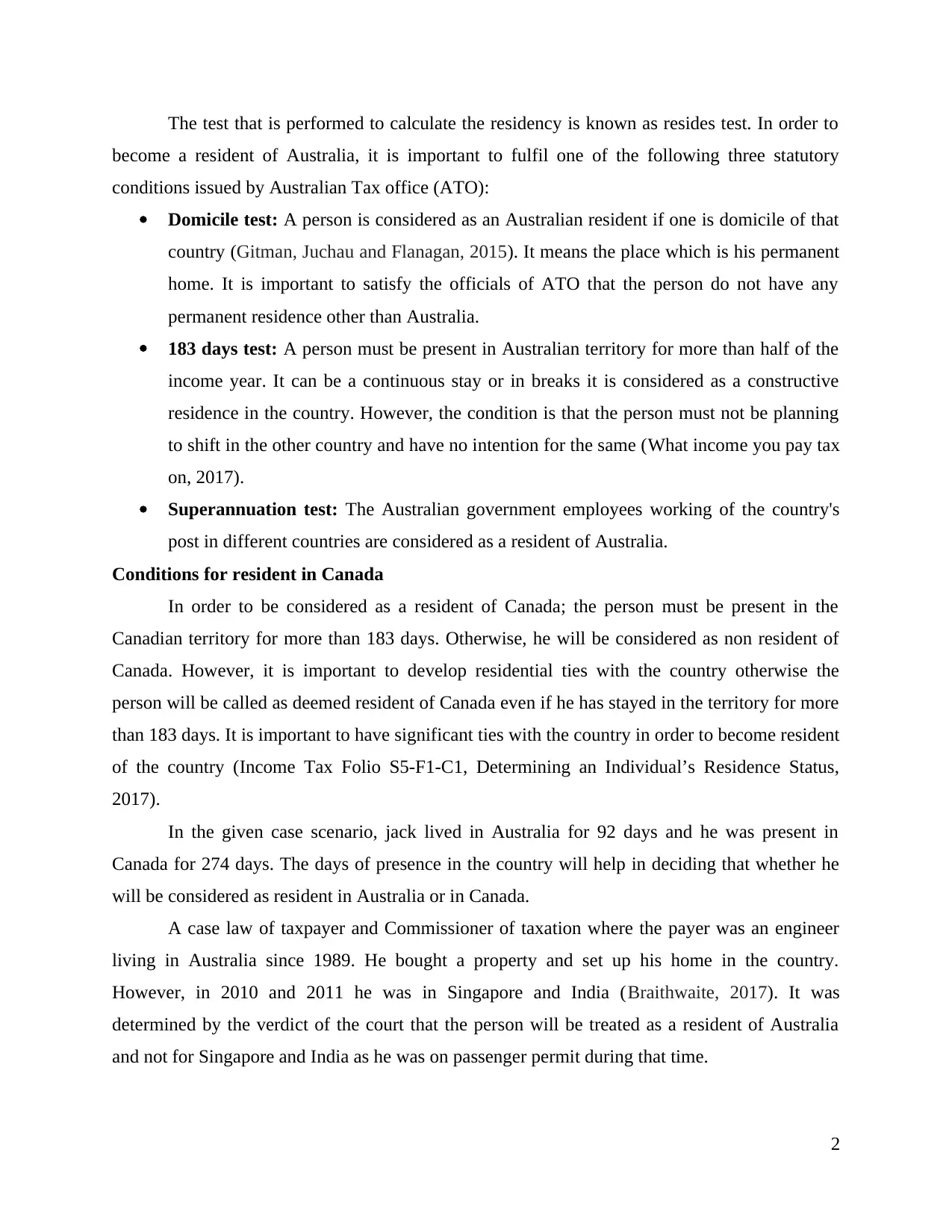
The test that is performed to calculate the residency is known as resides test. In order to
become a resident of Australia, it is important to fulfil one of the following three statutory
conditions issued by Australian Tax office (ATO):
Domicile test: A person is considered as an Australian resident if one is domicile of that
country (Gitman, Juchau and Flanagan, 2015). It means the place which is his permanent
home. It is important to satisfy the officials of ATO that the person do not have any
permanent residence other than Australia.
183 days test: A person must be present in Australian territory for more than half of the
income year. It can be a continuous stay or in breaks it is considered as a constructive
residence in the country. However, the condition is that the person must not be planning
to shift in the other country and have no intention for the same (What income you pay tax
on, 2017).
Superannuation test: The Australian government employees working of the country's
post in different countries are considered as a resident of Australia.
Conditions for resident in Canada
In order to be considered as a resident of Canada; the person must be present in the
Canadian territory for more than 183 days. Otherwise, he will be considered as non resident of
Canada. However, it is important to develop residential ties with the country otherwise the
person will be called as deemed resident of Canada even if he has stayed in the territory for more
than 183 days. It is important to have significant ties with the country in order to become resident
of the country (Income Tax Folio S5-F1-C1, Determining an Individual’s Residence Status,
2017).
In the given case scenario, jack lived in Australia for 92 days and he was present in
Canada for 274 days. The days of presence in the country will help in deciding that whether he
will be considered as resident in Australia or in Canada.
A case law of taxpayer and Commissioner of taxation where the payer was an engineer
living in Australia since 1989. He bought a property and set up his home in the country.
However, in 2010 and 2011 he was in Singapore and India (Braithwaite, 2017). It was
determined by the verdict of the court that the person will be treated as a resident of Australia
and not for Singapore and India as he was on passenger permit during that time.
2
become a resident of Australia, it is important to fulfil one of the following three statutory
conditions issued by Australian Tax office (ATO):
Domicile test: A person is considered as an Australian resident if one is domicile of that
country (Gitman, Juchau and Flanagan, 2015). It means the place which is his permanent
home. It is important to satisfy the officials of ATO that the person do not have any
permanent residence other than Australia.
183 days test: A person must be present in Australian territory for more than half of the
income year. It can be a continuous stay or in breaks it is considered as a constructive
residence in the country. However, the condition is that the person must not be planning
to shift in the other country and have no intention for the same (What income you pay tax
on, 2017).
Superannuation test: The Australian government employees working of the country's
post in different countries are considered as a resident of Australia.
Conditions for resident in Canada
In order to be considered as a resident of Canada; the person must be present in the
Canadian territory for more than 183 days. Otherwise, he will be considered as non resident of
Canada. However, it is important to develop residential ties with the country otherwise the
person will be called as deemed resident of Canada even if he has stayed in the territory for more
than 183 days. It is important to have significant ties with the country in order to become resident
of the country (Income Tax Folio S5-F1-C1, Determining an Individual’s Residence Status,
2017).
In the given case scenario, jack lived in Australia for 92 days and he was present in
Canada for 274 days. The days of presence in the country will help in deciding that whether he
will be considered as resident in Australia or in Canada.
A case law of taxpayer and Commissioner of taxation where the payer was an engineer
living in Australia since 1989. He bought a property and set up his home in the country.
However, in 2010 and 2011 he was in Singapore and India (Braithwaite, 2017). It was
determined by the verdict of the court that the person will be treated as a resident of Australia
and not for Singapore and India as he was on passenger permit during that time.
2
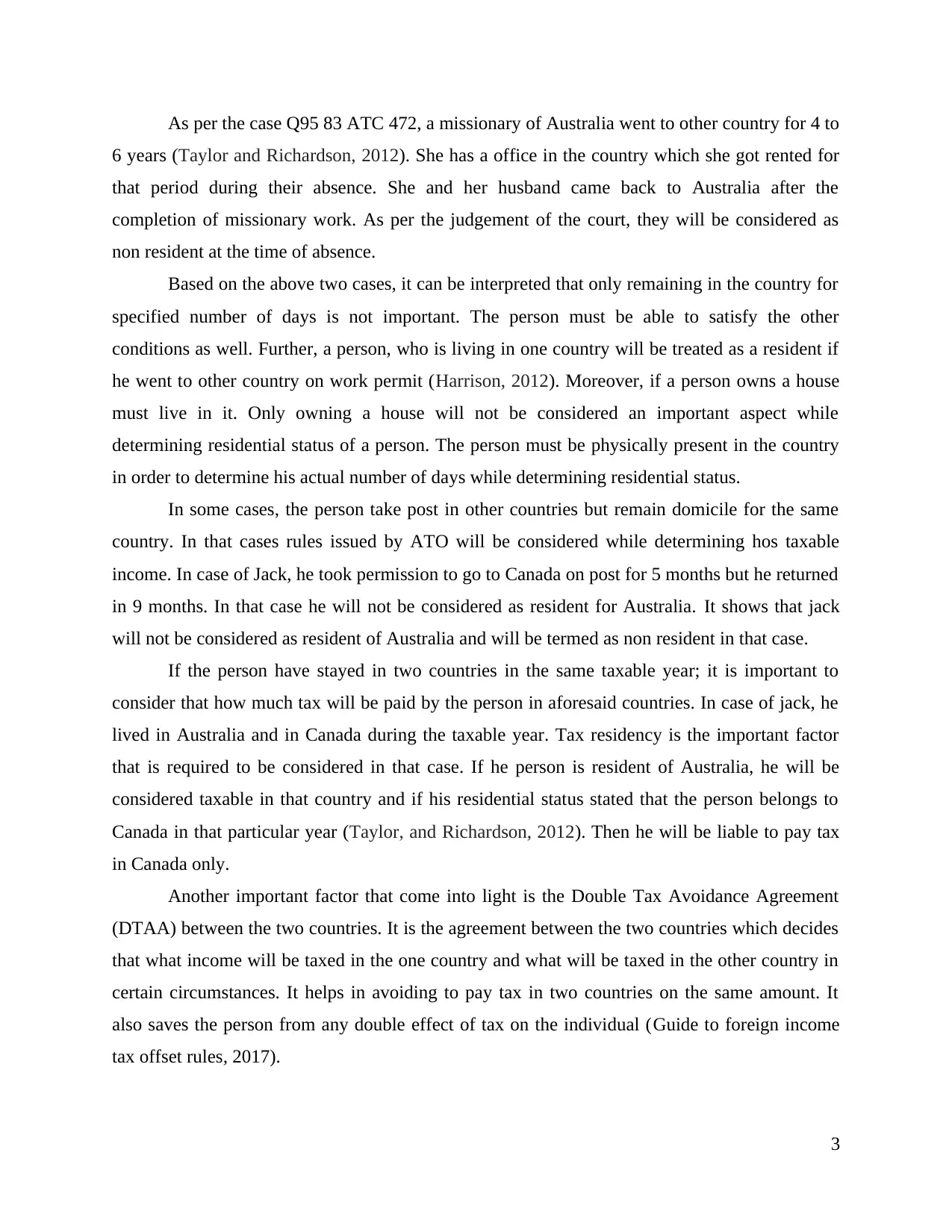
As per the case Q95 83 ATC 472, a missionary of Australia went to other country for 4 to
6 years (Taylor and Richardson, 2012). She has a office in the country which she got rented for
that period during their absence. She and her husband came back to Australia after the
completion of missionary work. As per the judgement of the court, they will be considered as
non resident at the time of absence.
Based on the above two cases, it can be interpreted that only remaining in the country for
specified number of days is not important. The person must be able to satisfy the other
conditions as well. Further, a person, who is living in one country will be treated as a resident if
he went to other country on work permit (Harrison, 2012). Moreover, if a person owns a house
must live in it. Only owning a house will not be considered an important aspect while
determining residential status of a person. The person must be physically present in the country
in order to determine his actual number of days while determining residential status.
In some cases, the person take post in other countries but remain domicile for the same
country. In that cases rules issued by ATO will be considered while determining hos taxable
income. In case of Jack, he took permission to go to Canada on post for 5 months but he returned
in 9 months. In that case he will not be considered as resident for Australia. It shows that jack
will not be considered as resident of Australia and will be termed as non resident in that case.
If the person have stayed in two countries in the same taxable year; it is important to
consider that how much tax will be paid by the person in aforesaid countries. In case of jack, he
lived in Australia and in Canada during the taxable year. Tax residency is the important factor
that is required to be considered in that case. If he person is resident of Australia, he will be
considered taxable in that country and if his residential status stated that the person belongs to
Canada in that particular year (Taylor, and Richardson, 2012). Then he will be liable to pay tax
in Canada only.
Another important factor that come into light is the Double Tax Avoidance Agreement
(DTAA) between the two countries. It is the agreement between the two countries which decides
that what income will be taxed in the one country and what will be taxed in the other country in
certain circumstances. It helps in avoiding to pay tax in two countries on the same amount. It
also saves the person from any double effect of tax on the individual (Guide to foreign income
tax offset rules, 2017).
3
6 years (Taylor and Richardson, 2012). She has a office in the country which she got rented for
that period during their absence. She and her husband came back to Australia after the
completion of missionary work. As per the judgement of the court, they will be considered as
non resident at the time of absence.
Based on the above two cases, it can be interpreted that only remaining in the country for
specified number of days is not important. The person must be able to satisfy the other
conditions as well. Further, a person, who is living in one country will be treated as a resident if
he went to other country on work permit (Harrison, 2012). Moreover, if a person owns a house
must live in it. Only owning a house will not be considered an important aspect while
determining residential status of a person. The person must be physically present in the country
in order to determine his actual number of days while determining residential status.
In some cases, the person take post in other countries but remain domicile for the same
country. In that cases rules issued by ATO will be considered while determining hos taxable
income. In case of Jack, he took permission to go to Canada on post for 5 months but he returned
in 9 months. In that case he will not be considered as resident for Australia. It shows that jack
will not be considered as resident of Australia and will be termed as non resident in that case.
If the person have stayed in two countries in the same taxable year; it is important to
consider that how much tax will be paid by the person in aforesaid countries. In case of jack, he
lived in Australia and in Canada during the taxable year. Tax residency is the important factor
that is required to be considered in that case. If he person is resident of Australia, he will be
considered taxable in that country and if his residential status stated that the person belongs to
Canada in that particular year (Taylor, and Richardson, 2012). Then he will be liable to pay tax
in Canada only.
Another important factor that come into light is the Double Tax Avoidance Agreement
(DTAA) between the two countries. It is the agreement between the two countries which decides
that what income will be taxed in the one country and what will be taxed in the other country in
certain circumstances. It helps in avoiding to pay tax in two countries on the same amount. It
also saves the person from any double effect of tax on the individual (Guide to foreign income
tax offset rules, 2017).
3
⊘ This is a preview!⊘
Do you want full access?
Subscribe today to unlock all pages.

Trusted by 1+ million students worldwide
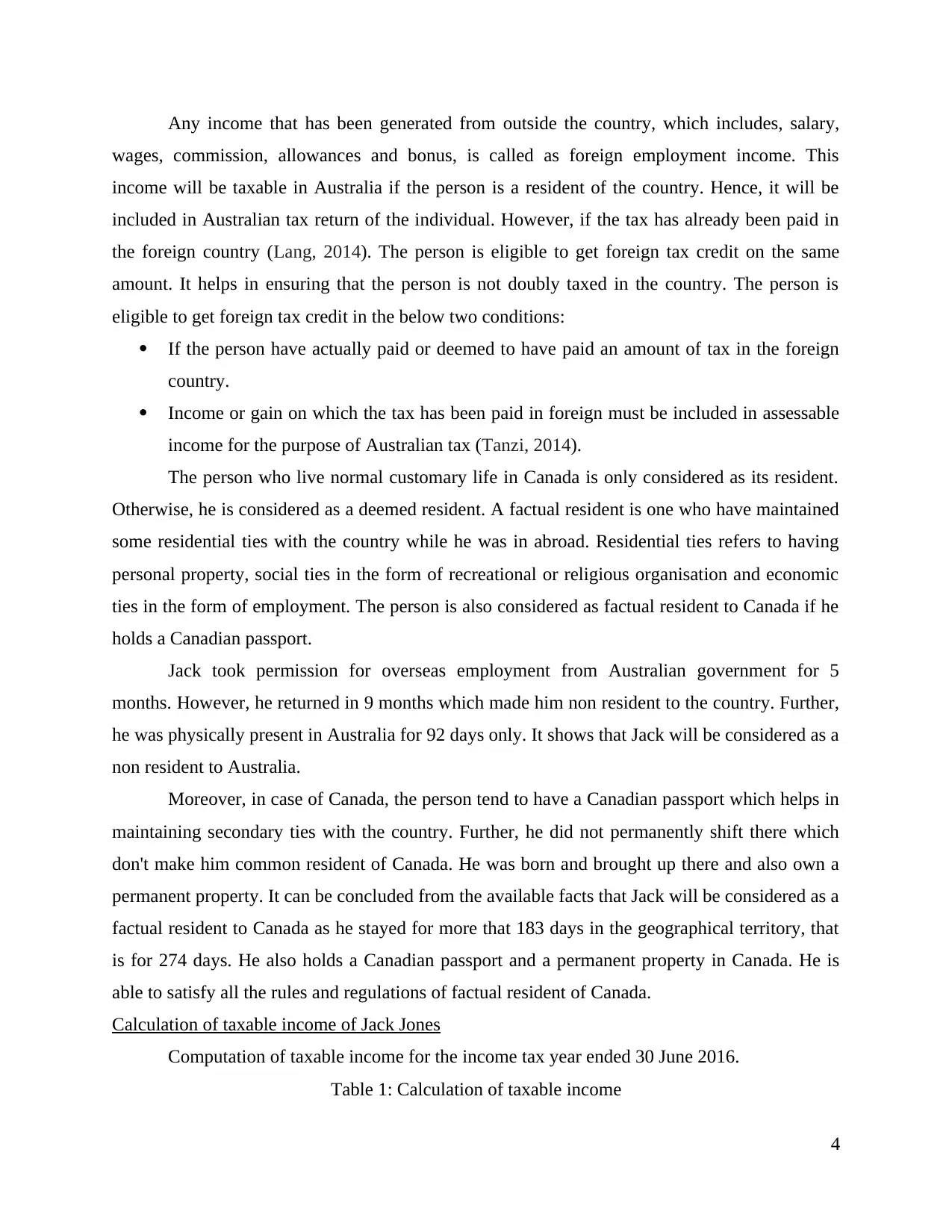
Any income that has been generated from outside the country, which includes, salary,
wages, commission, allowances and bonus, is called as foreign employment income. This
income will be taxable in Australia if the person is a resident of the country. Hence, it will be
included in Australian tax return of the individual. However, if the tax has already been paid in
the foreign country (Lang, 2014). The person is eligible to get foreign tax credit on the same
amount. It helps in ensuring that the person is not doubly taxed in the country. The person is
eligible to get foreign tax credit in the below two conditions:
If the person have actually paid or deemed to have paid an amount of tax in the foreign
country.
Income or gain on which the tax has been paid in foreign must be included in assessable
income for the purpose of Australian tax (Tanzi, 2014).
The person who live normal customary life in Canada is only considered as its resident.
Otherwise, he is considered as a deemed resident. A factual resident is one who have maintained
some residential ties with the country while he was in abroad. Residential ties refers to having
personal property, social ties in the form of recreational or religious organisation and economic
ties in the form of employment. The person is also considered as factual resident to Canada if he
holds a Canadian passport.
Jack took permission for overseas employment from Australian government for 5
months. However, he returned in 9 months which made him non resident to the country. Further,
he was physically present in Australia for 92 days only. It shows that Jack will be considered as a
non resident to Australia.
Moreover, in case of Canada, the person tend to have a Canadian passport which helps in
maintaining secondary ties with the country. Further, he did not permanently shift there which
don't make him common resident of Canada. He was born and brought up there and also own a
permanent property. It can be concluded from the available facts that Jack will be considered as a
factual resident to Canada as he stayed for more that 183 days in the geographical territory, that
is for 274 days. He also holds a Canadian passport and a permanent property in Canada. He is
able to satisfy all the rules and regulations of factual resident of Canada.
Calculation of taxable income of Jack Jones
Computation of taxable income for the income tax year ended 30 June 2016.
Table 1: Calculation of taxable income
4
wages, commission, allowances and bonus, is called as foreign employment income. This
income will be taxable in Australia if the person is a resident of the country. Hence, it will be
included in Australian tax return of the individual. However, if the tax has already been paid in
the foreign country (Lang, 2014). The person is eligible to get foreign tax credit on the same
amount. It helps in ensuring that the person is not doubly taxed in the country. The person is
eligible to get foreign tax credit in the below two conditions:
If the person have actually paid or deemed to have paid an amount of tax in the foreign
country.
Income or gain on which the tax has been paid in foreign must be included in assessable
income for the purpose of Australian tax (Tanzi, 2014).
The person who live normal customary life in Canada is only considered as its resident.
Otherwise, he is considered as a deemed resident. A factual resident is one who have maintained
some residential ties with the country while he was in abroad. Residential ties refers to having
personal property, social ties in the form of recreational or religious organisation and economic
ties in the form of employment. The person is also considered as factual resident to Canada if he
holds a Canadian passport.
Jack took permission for overseas employment from Australian government for 5
months. However, he returned in 9 months which made him non resident to the country. Further,
he was physically present in Australia for 92 days only. It shows that Jack will be considered as a
non resident to Australia.
Moreover, in case of Canada, the person tend to have a Canadian passport which helps in
maintaining secondary ties with the country. Further, he did not permanently shift there which
don't make him common resident of Canada. He was born and brought up there and also own a
permanent property. It can be concluded from the available facts that Jack will be considered as a
factual resident to Canada as he stayed for more that 183 days in the geographical territory, that
is for 274 days. He also holds a Canadian passport and a permanent property in Canada. He is
able to satisfy all the rules and regulations of factual resident of Canada.
Calculation of taxable income of Jack Jones
Computation of taxable income for the income tax year ended 30 June 2016.
Table 1: Calculation of taxable income
4
Paraphrase This Document
Need a fresh take? Get an instant paraphrase of this document with our AI Paraphraser
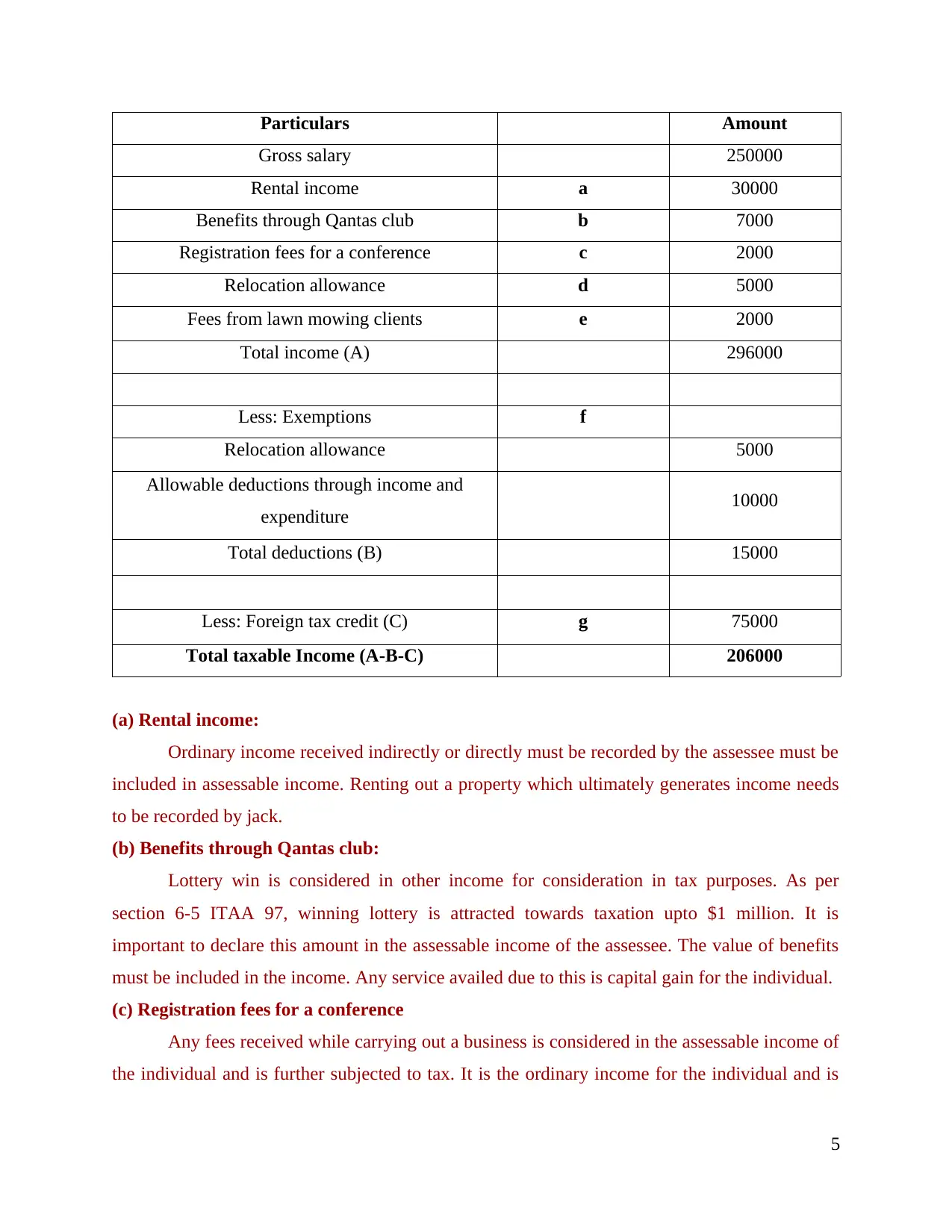
Particulars Amount
Gross salary 250000
Rental income a 30000
Benefits through Qantas club b 7000
Registration fees for a conference c 2000
Relocation allowance d 5000
Fees from lawn mowing clients e 2000
Total income (A) 296000
Less: Exemptions f
Relocation allowance 5000
Allowable deductions through income and
expenditure 10000
Total deductions (B) 15000
Less: Foreign tax credit (C) g 75000
Total taxable Income (A-B-C) 206000
(a) Rental income:
Ordinary income received indirectly or directly must be recorded by the assessee must be
included in assessable income. Renting out a property which ultimately generates income needs
to be recorded by jack.
(b) Benefits through Qantas club:
Lottery win is considered in other income for consideration in tax purposes. As per
section 6-5 ITAA 97, winning lottery is attracted towards taxation upto $1 million. It is
important to declare this amount in the assessable income of the assessee. The value of benefits
must be included in the income. Any service availed due to this is capital gain for the individual.
(c) Registration fees for a conference
Any fees received while carrying out a business is considered in the assessable income of
the individual and is further subjected to tax. It is the ordinary income for the individual and is
5
Gross salary 250000
Rental income a 30000
Benefits through Qantas club b 7000
Registration fees for a conference c 2000
Relocation allowance d 5000
Fees from lawn mowing clients e 2000
Total income (A) 296000
Less: Exemptions f
Relocation allowance 5000
Allowable deductions through income and
expenditure 10000
Total deductions (B) 15000
Less: Foreign tax credit (C) g 75000
Total taxable Income (A-B-C) 206000
(a) Rental income:
Ordinary income received indirectly or directly must be recorded by the assessee must be
included in assessable income. Renting out a property which ultimately generates income needs
to be recorded by jack.
(b) Benefits through Qantas club:
Lottery win is considered in other income for consideration in tax purposes. As per
section 6-5 ITAA 97, winning lottery is attracted towards taxation upto $1 million. It is
important to declare this amount in the assessable income of the assessee. The value of benefits
must be included in the income. Any service availed due to this is capital gain for the individual.
(c) Registration fees for a conference
Any fees received while carrying out a business is considered in the assessable income of
the individual and is further subjected to tax. It is the ordinary income for the individual and is
5
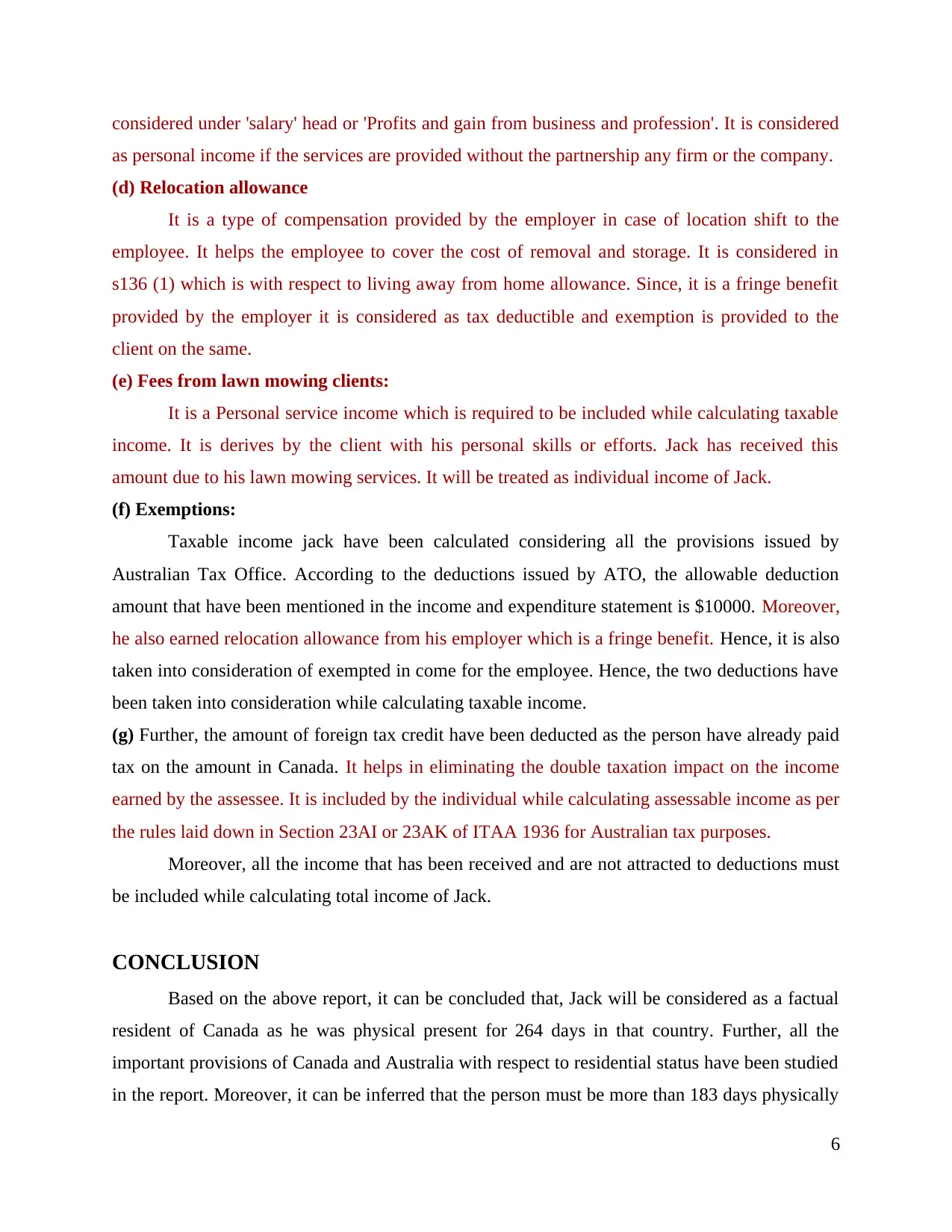
considered under 'salary' head or 'Profits and gain from business and profession'. It is considered
as personal income if the services are provided without the partnership any firm or the company.
(d) Relocation allowance
It is a type of compensation provided by the employer in case of location shift to the
employee. It helps the employee to cover the cost of removal and storage. It is considered in
s136 (1) which is with respect to living away from home allowance. Since, it is a fringe benefit
provided by the employer it is considered as tax deductible and exemption is provided to the
client on the same.
(e) Fees from lawn mowing clients:
It is a Personal service income which is required to be included while calculating taxable
income. It is derives by the client with his personal skills or efforts. Jack has received this
amount due to his lawn mowing services. It will be treated as individual income of Jack.
(f) Exemptions:
Taxable income jack have been calculated considering all the provisions issued by
Australian Tax Office. According to the deductions issued by ATO, the allowable deduction
amount that have been mentioned in the income and expenditure statement is $10000. Moreover,
he also earned relocation allowance from his employer which is a fringe benefit. Hence, it is also
taken into consideration of exempted in come for the employee. Hence, the two deductions have
been taken into consideration while calculating taxable income.
(g) Further, the amount of foreign tax credit have been deducted as the person have already paid
tax on the amount in Canada. It helps in eliminating the double taxation impact on the income
earned by the assessee. It is included by the individual while calculating assessable income as per
the rules laid down in Section 23AI or 23AK of ITAA 1936 for Australian tax purposes.
Moreover, all the income that has been received and are not attracted to deductions must
be included while calculating total income of Jack.
CONCLUSION
Based on the above report, it can be concluded that, Jack will be considered as a factual
resident of Canada as he was physical present for 264 days in that country. Further, all the
important provisions of Canada and Australia with respect to residential status have been studied
in the report. Moreover, it can be inferred that the person must be more than 183 days physically
6
as personal income if the services are provided without the partnership any firm or the company.
(d) Relocation allowance
It is a type of compensation provided by the employer in case of location shift to the
employee. It helps the employee to cover the cost of removal and storage. It is considered in
s136 (1) which is with respect to living away from home allowance. Since, it is a fringe benefit
provided by the employer it is considered as tax deductible and exemption is provided to the
client on the same.
(e) Fees from lawn mowing clients:
It is a Personal service income which is required to be included while calculating taxable
income. It is derives by the client with his personal skills or efforts. Jack has received this
amount due to his lawn mowing services. It will be treated as individual income of Jack.
(f) Exemptions:
Taxable income jack have been calculated considering all the provisions issued by
Australian Tax Office. According to the deductions issued by ATO, the allowable deduction
amount that have been mentioned in the income and expenditure statement is $10000. Moreover,
he also earned relocation allowance from his employer which is a fringe benefit. Hence, it is also
taken into consideration of exempted in come for the employee. Hence, the two deductions have
been taken into consideration while calculating taxable income.
(g) Further, the amount of foreign tax credit have been deducted as the person have already paid
tax on the amount in Canada. It helps in eliminating the double taxation impact on the income
earned by the assessee. It is included by the individual while calculating assessable income as per
the rules laid down in Section 23AI or 23AK of ITAA 1936 for Australian tax purposes.
Moreover, all the income that has been received and are not attracted to deductions must
be included while calculating total income of Jack.
CONCLUSION
Based on the above report, it can be concluded that, Jack will be considered as a factual
resident of Canada as he was physical present for 264 days in that country. Further, all the
important provisions of Canada and Australia with respect to residential status have been studied
in the report. Moreover, it can be inferred that the person must be more than 183 days physically
6
⊘ This is a preview!⊘
Do you want full access?
Subscribe today to unlock all pages.

Trusted by 1+ million students worldwide

present in order to become resident of that country. In the end, the calculated taxable amount of
Jack is 206,000.
7
Jack is 206,000.
7
Paraphrase This Document
Need a fresh take? Get an instant paraphrase of this document with our AI Paraphraser
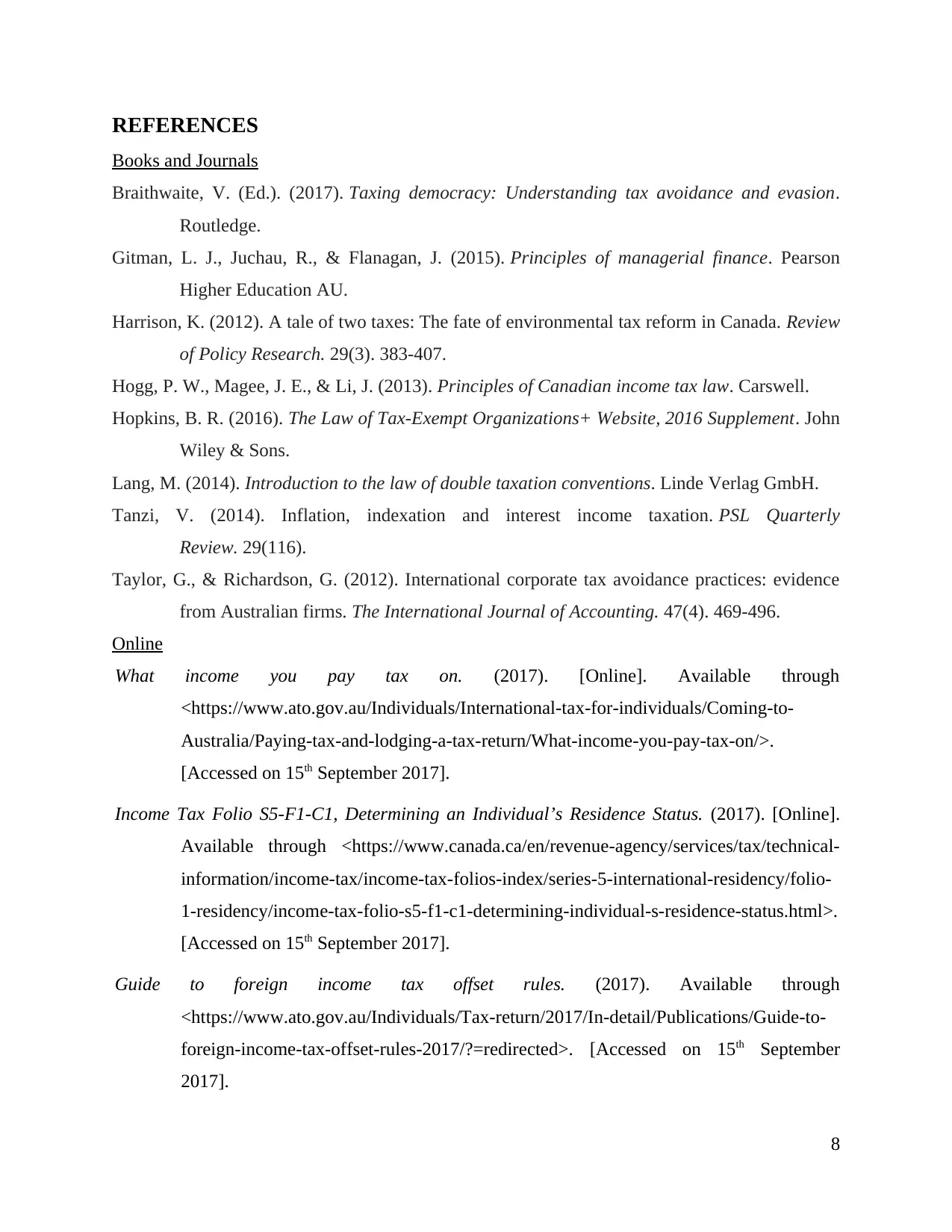
REFERENCES
Books and Journals
Braithwaite, V. (Ed.). (2017). Taxing democracy: Understanding tax avoidance and evasion.
Routledge.
Gitman, L. J., Juchau, R., & Flanagan, J. (2015). Principles of managerial finance. Pearson
Higher Education AU.
Harrison, K. (2012). A tale of two taxes: The fate of environmental tax reform in Canada. Review
of Policy Research. 29(3). 383-407.
Hogg, P. W., Magee, J. E., & Li, J. (2013). Principles of Canadian income tax law. Carswell.
Hopkins, B. R. (2016). The Law of Tax-Exempt Organizations+ Website, 2016 Supplement. John
Wiley & Sons.
Lang, M. (2014). Introduction to the law of double taxation conventions. Linde Verlag GmbH.
Tanzi, V. (2014). Inflation, indexation and interest income taxation. PSL Quarterly
Review. 29(116).
Taylor, G., & Richardson, G. (2012). International corporate tax avoidance practices: evidence
from Australian firms. The International Journal of Accounting. 47(4). 469-496.
Online
What income you pay tax on. (2017). [Online]. Available through
<https://www.ato.gov.au/Individuals/International-tax-for-individuals/Coming-to-
Australia/Paying-tax-and-lodging-a-tax-return/What-income-you-pay-tax-on/>.
[Accessed on 15th September 2017].
Income Tax Folio S5-F1-C1, Determining an Individual’s Residence Status. (2017). [Online].
Available through <https://www.canada.ca/en/revenue-agency/services/tax/technical-
information/income-tax/income-tax-folios-index/series-5-international-residency/folio-
1-residency/income-tax-folio-s5-f1-c1-determining-individual-s-residence-status.html>.
[Accessed on 15th September 2017].
Guide to foreign income tax offset rules. (2017). Available through
<https://www.ato.gov.au/Individuals/Tax-return/2017/In-detail/Publications/Guide-to-
foreign-income-tax-offset-rules-2017/?=redirected>. [Accessed on 15th September
2017].
8
Books and Journals
Braithwaite, V. (Ed.). (2017). Taxing democracy: Understanding tax avoidance and evasion.
Routledge.
Gitman, L. J., Juchau, R., & Flanagan, J. (2015). Principles of managerial finance. Pearson
Higher Education AU.
Harrison, K. (2012). A tale of two taxes: The fate of environmental tax reform in Canada. Review
of Policy Research. 29(3). 383-407.
Hogg, P. W., Magee, J. E., & Li, J. (2013). Principles of Canadian income tax law. Carswell.
Hopkins, B. R. (2016). The Law of Tax-Exempt Organizations+ Website, 2016 Supplement. John
Wiley & Sons.
Lang, M. (2014). Introduction to the law of double taxation conventions. Linde Verlag GmbH.
Tanzi, V. (2014). Inflation, indexation and interest income taxation. PSL Quarterly
Review. 29(116).
Taylor, G., & Richardson, G. (2012). International corporate tax avoidance practices: evidence
from Australian firms. The International Journal of Accounting. 47(4). 469-496.
Online
What income you pay tax on. (2017). [Online]. Available through
<https://www.ato.gov.au/Individuals/International-tax-for-individuals/Coming-to-
Australia/Paying-tax-and-lodging-a-tax-return/What-income-you-pay-tax-on/>.
[Accessed on 15th September 2017].
Income Tax Folio S5-F1-C1, Determining an Individual’s Residence Status. (2017). [Online].
Available through <https://www.canada.ca/en/revenue-agency/services/tax/technical-
information/income-tax/income-tax-folios-index/series-5-international-residency/folio-
1-residency/income-tax-folio-s5-f1-c1-determining-individual-s-residence-status.html>.
[Accessed on 15th September 2017].
Guide to foreign income tax offset rules. (2017). Available through
<https://www.ato.gov.au/Individuals/Tax-return/2017/In-detail/Publications/Guide-to-
foreign-income-tax-offset-rules-2017/?=redirected>. [Accessed on 15th September
2017].
8
1 out of 11
Related Documents
Your All-in-One AI-Powered Toolkit for Academic Success.
+13062052269
info@desklib.com
Available 24*7 on WhatsApp / Email
![[object Object]](/_next/static/media/star-bottom.7253800d.svg)
Unlock your academic potential
Copyright © 2020–2026 A2Z Services. All Rights Reserved. Developed and managed by ZUCOL.





